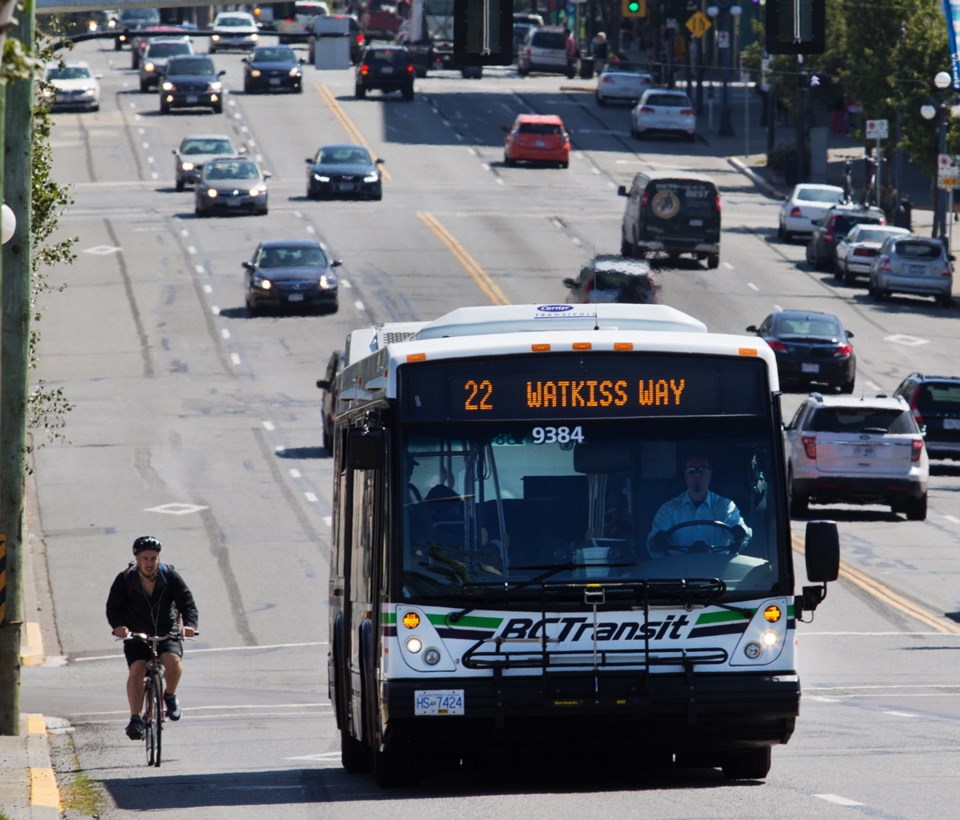The push to build bus lanes between downtown and the West Shore could get a big boost from funding programs announced in Tuesday’s federal budget.
Ottawa said it will provide $750 million for public transit over two years, starting in 2017-18, and then $1 billion a year after that.
“It’s for transit and then there’s another $5.8 billion for infrastructure — somewhere in that process, there’s got to be money for the lanes to the West Shore,” said Bruce Carter, Greater Victoria Chamber of Commerce CEO.
Building the bus-only lanes has been a top priority for the Greater Victoria Transit Commission and municipalities, seen as a way to bypass single-vehicle congestion and speed commuters both ways on the Colwood Crawl.
Construction of one kilometre of bus-priority lanes along Douglas Street has been completed, with more underway.
The federal budget promises come in an election year and depend on the Conservative government being re-elected.
If the promises are kept, it will be two years before the transit funding kicks in.
Still, it was enough spark optimism.
“Finally some common sense! Let’s get transit out of the congestion,” said Saanich Coun. Judy Brownoff in a Facebook message.
The money on the table should fire up the province and local leaders to get their share, Carter said. “Do we have to fight for it? You bet. It’s going to be over-subscribed.”
Carter suggested that building an interchange at McKenzie Avenue and the Trans-Canada Highway is likely a part of getting bus-priority lanes to the West Shore. The province has already identified the cost of the interchange as $80 million to $100 million.
While the federal budget provides public transit money, it’s also expected to take money away from B.C.
The province could lose anywhere from $18 million to $30 million as a result of the budget’s tax changes, B.C. Finance Minister Mike de Jong said.
But de Jong said the B.C. Liberal government generally supports the tax changes and will absorb the negative impact without much difficulty.
NDP finance critic Carole James countered that B.C. can little afford a major hit to its coffers.
“We’re not funding the basics,” she said. “We’re not funding education properly. We see long wait lists for health care.
“And the finance minister says, ‘Oh, it’s fine, we can give up dollars to the federal government.’ That doesn’t sound like he’s standing up for British Columbia to me.”
De Jong said his estimate of the impact was based on a preliminary analysis by staff. When federal tax rates get reduced, there is a flow-through effect on the province, he said.
B.C. supports plans to reduce the small business tax rate, he said. “We’re philosophically aligned with the move.”
James said the federal budget appeared to have nothing to reduce costs for B.C. Ferries, improve response to oil spills on the West Coast, or tackle gang violence on the Lower Mainland.
“So some very key issues to our province, I felt, were completely ignored in this budget and I think it really shows, as I’ve said, that the B.C. Liberals have been failing in their advocacy work,” she said.
Green Leader Elizabeth May, MP for Saanich-Gulf Islands, said she found just one bright spot for Islanders — $2 million for the Pacific Salmon Foundation for the Salish Sea Marine Survival Project in 2015-2016.
“That was a surprise,” said May, adding she doesn’t look at a Harper budget expecting to find anything for the environment.
With files from Katherine Dedyna, Lindsay Kines and Cindy E. Harnett
This is a corrected version of an earlier story.



